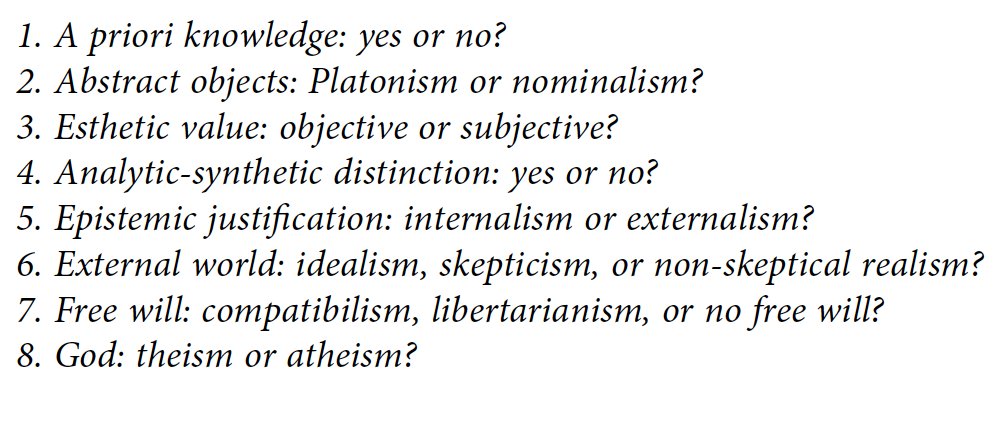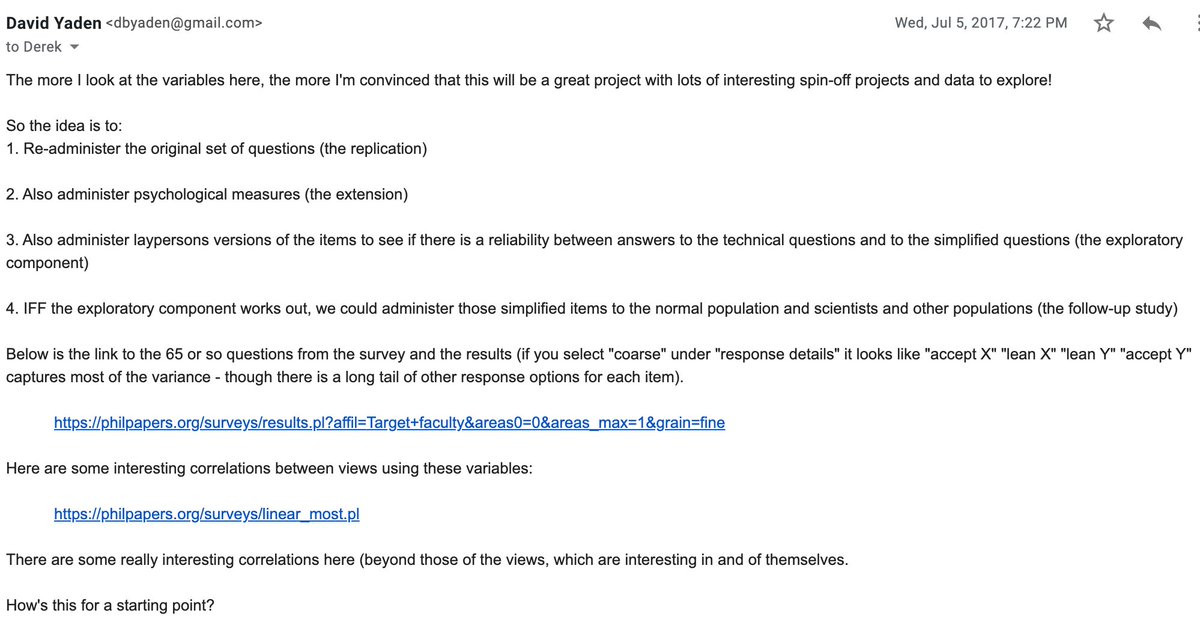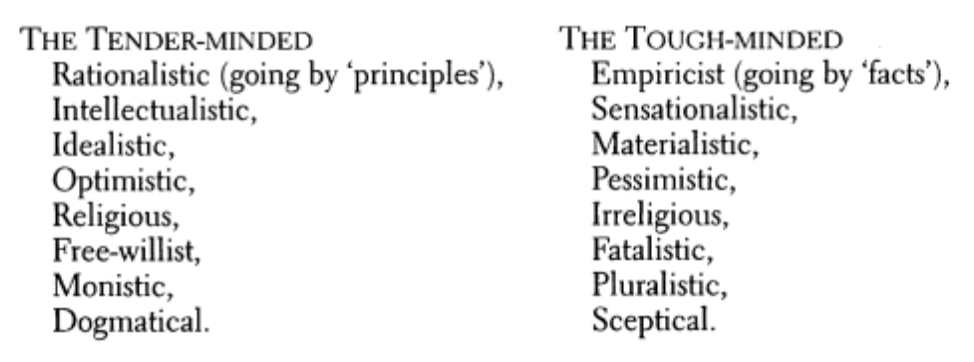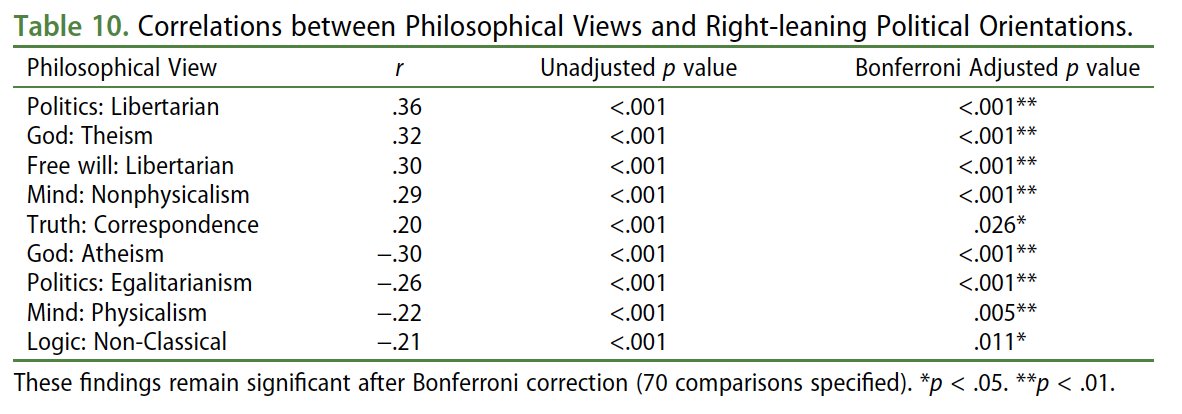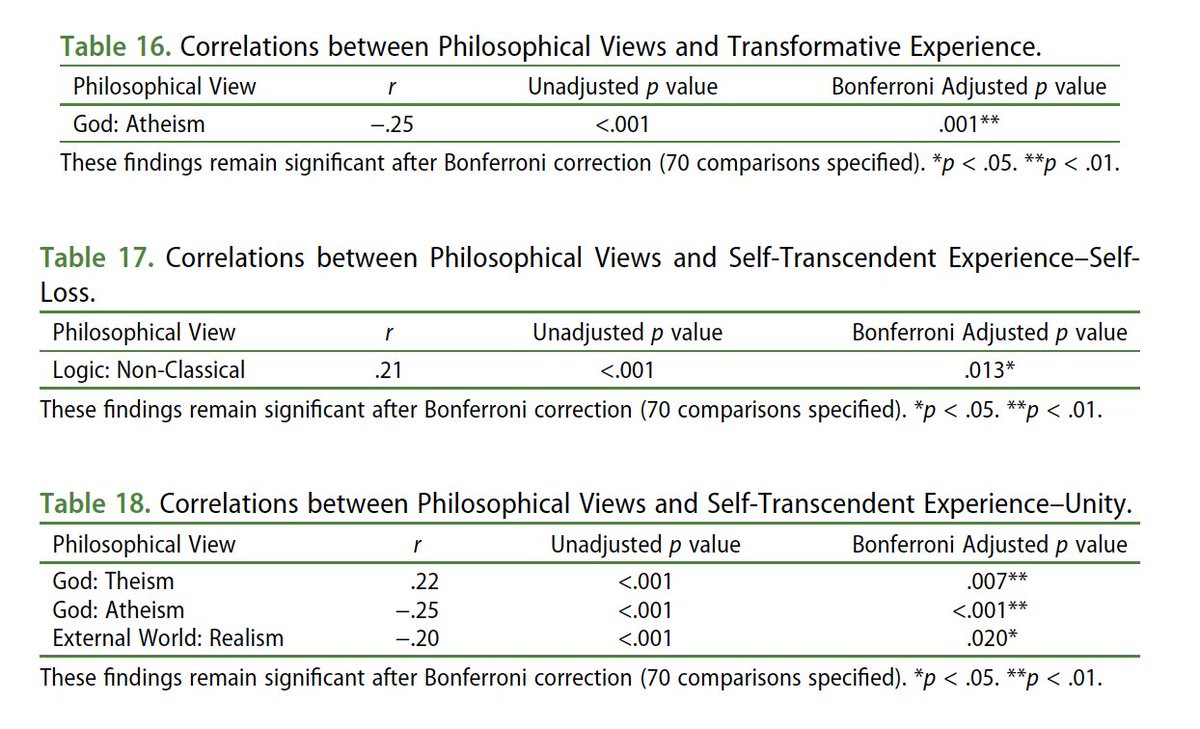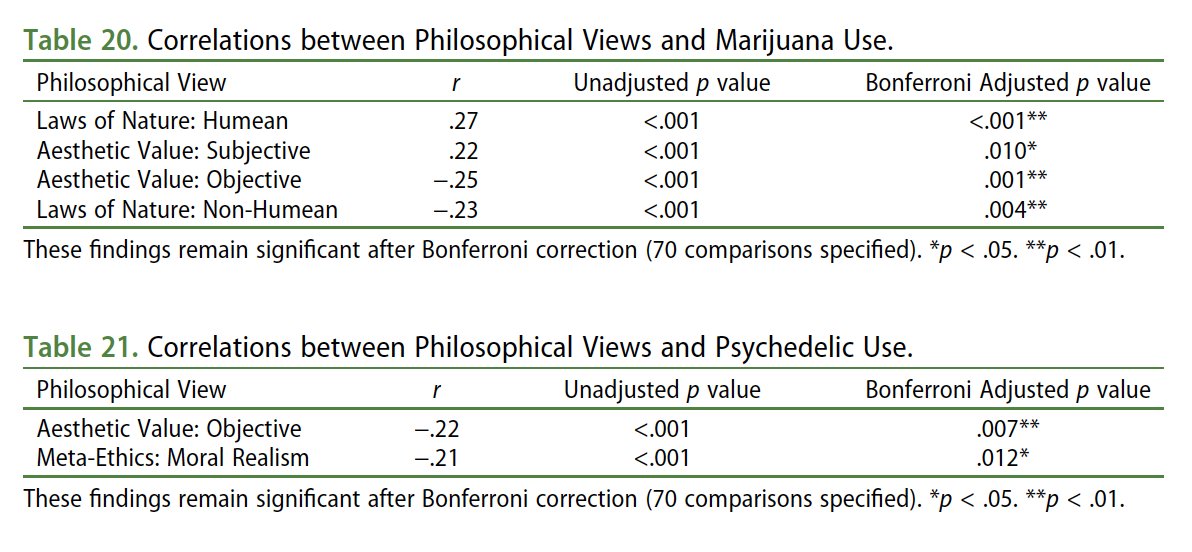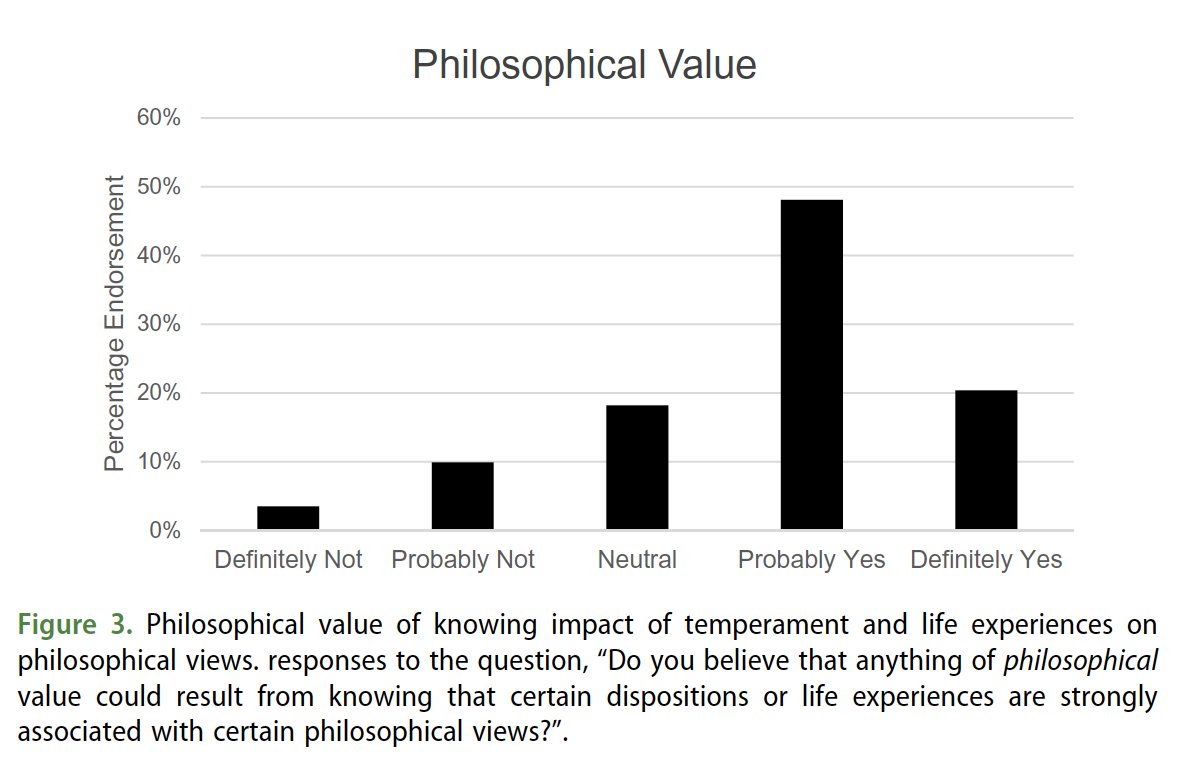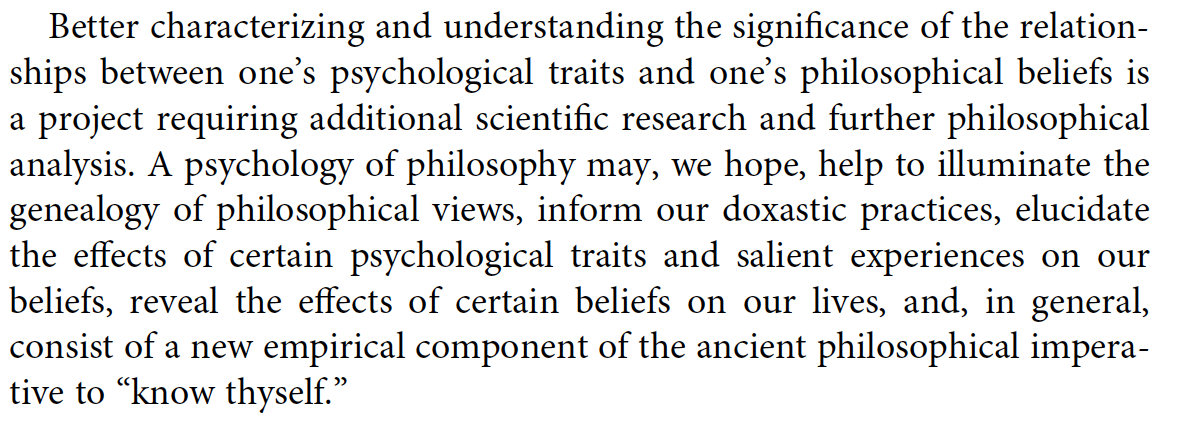New article from me & Derek Anderson reporting on a sample of professors of philosophy (& some grad stud/postdoc). We examined whether psychological traits predict philosophical views. What did we find?
A https://abs.twimg.com/emoji/v2/... draggable="false" alt="🧵" title="Thread" aria-label="Emoji: Thread">... https://www.researchgate.net/publication/351156867_The_psychology_of_philosophy_Associating_philosophical_views_with_psychological_traits_in_professional_philosophers">https://www.researchgate.net/publicati...
https://abs.twimg.com/emoji/v2/... draggable="false" alt="🧵" title="Thread" aria-label="Emoji: Thread">... https://www.researchgate.net/publication/351156867_The_psychology_of_philosophy_Associating_philosophical_views_with_psychological_traits_in_professional_philosophers">https://www.researchgate.net/publicati...
A
This article is a long time in the making. The ideas began in undergrad w/ discussions between myself (a psych major) and Derek (a philosophy major), my childhood friend, then college roommate, now co-author. There& #39;s a notebook page from then with "psych of phil" written on it :)
In those days, we talked about how certain types of people seemed to gravitate towards certain views in our philosophy and cog sci clubs - and how maybe a “psychology of philosophy” could examine this issue.
The next major step was when David Bourget & David Chalmers published their PhilPapers Survey in an article called “What do Philosophers Believe?”. Derek sent this to me while he was doing his PhD in philosophy and I was starting my PhD in psychology:
https://philpapers.org/archive/bouwdp ">https://philpapers.org/archive/b...
https://philpapers.org/archive/bouwdp ">https://philpapers.org/archive/b...
I found this article thrilling—the idea that complex philosophical views could be parsimoniously captured and measured (though imperfectly). I hung this paper on the wall in my room for awhile. I recommend reading it. They& #39;re conducting a follow-up survey: https://philpapers.org/bbs/thread.pl?tId=7022">https://philpapers.org/bbs/threa...
While the Bourget and Chalmers paper reported correlations between philosophical views and between philosophical views and demographics, they didn’t administer any psychological measures. I always wished they had included psych traits like personality, etc.
I realized this study could be done (by me!) by replicating the PhilPapers survey and simply adding psych measures and then administering it to professors of philosophy at top programs (as well as some grad students/postdocs, together = "professional philosophers")
During my PhD, I focused some of my research on life-changing experiences (e.g., transformative and/or self-transcendent) and I wondered about the belief changes related to such experiences. I thought Bourget and Chalmers PhilPapers survey might provide some good items to use.
But there was a problem… The items in PhilPapers Survey are basically just labels for very complex, technical philosophical views. They would need to be “translated” into language that non-philosophers could understand.
Some are obvious but most are not:
Some are obvious but most are not:
On a visit to Philly in July 2017, over a few drinks, Derek and I realized that this could be an project for us to collaborate on using our respective doctoral training. Derek led the translation effort and I’m so grateful I was able to work on this with him.
An initial email :)
An initial email :)
The translation process took YEARS! This involved 100s of emails b/w us, focus groups of psychologists and philosophers at UPenn, and conversations at conferences like SPP. It’s an impossible task to get these exactly right, but I think many of them actually work quite well.
The study itself posed problems. There was little work in this area so it was difficult to think of hypotheses to pre-register and measures to include. But we kept stumbling upon relevant work, which we discuss in the article. The article is also a tidy review of this research.
I’m an amateur/aspiring William James scholar/fan, so I took the major framing from his Pragmatism. James makes a distinction b/w “tender minded” (freewill, religious, optimistic) - and the “tough minded” (deterministic, irreligious, skeptical). A start:
We asked LOTS of people to offer other hypotheses to consider or scales to include. Barbara Mellers (CRT), Jon Baron (numeracy), Paul Bloom @paulbloomatyale (short form personality), L. A. Paul @trexproject (transformative exp) and others. Thank you to all!
We pre-registered our primary hypotheses and stated that there would be a large exploratory component, which would be corrected for multiple comparisons. Many people we spoke with mentioned the problem of multiple comparisons, so we opted for an extremely conservative approach...
We ended up Bonferroni correcting for 70 multiple comparisons in every table (very conservative). We provide corrected and uncorrected p values in the main paper and the supplement. We expect that many readers will find the supplement more interesting than the paper itself.
We always intended to replicate the Bourget and Chalmers PhilPapers Survey, so we did. But many psychometric issues came up due to the original response options. It was a nightmare to use the coding scheme. We will NOT follow this precedent in the future, but it works for now.
Our manuscript was stuck in review limbo for a long time (submitted Sept 2019). It weathered a transfer b/w editors (thanks to our eventual editor). An anonymous reviewer required us to do analyses beyond our pre-registration which we would not have chosen to do...
For example, due to this reviewer we needed to factor analyze ALL of our psych variables and our philosophical view variables and then run multiple regressions. The validity of doing all of this is unclear so it should be considered very exploratory (probably best ignored).
So…what did we find?
A lot! We see this as a new area with many possibilities.
(Again, take a look at the supplement).
A lot! We see this as a new area with many possibilities.
(Again, take a look at the supplement).
The frequency of endorsement of the philosophical views was very similar to what Bourget & Chalmers reported, so we consider this something of a replication. It also suggests that while our sample was smaller it is likely fairly representative of the field.
Also, the top correlations between philosophical views was very similar to what Bourget and Chalmers report, so these also seem fairly stable in the field.
Again, all of the following results are corrected for multiple comparisons in a VERY strict manner, so this should be kept in mind.
(Again, take a look at the supplement).
(Again, take a look at the supplement).
drumroll...
We observed no relationships between philosophical views and gender, age, ethnicity, relationship status, academic rank, or income.
(But lack of evidence not evidence of lack).
We observed no relationships between philosophical views and gender, age, ethnicity, relationship status, academic rank, or income.
(But lack of evidence not evidence of lack).
No relationships between philosophical views and personality
(But lack of evidence not evidence of lack).
(But lack of evidence not evidence of lack).
An association between Hard Determinism (no free will) and more depression - as well as lower life satisfaction:
Associations between various life-changing moments (i.e., "transformative experience" @trexproject) and/or intensely altered states of consciousness involving self-loss and connectedness (i.e., "self-transcendent experience" @JonHaidt)
There were a number of relationships between psychopharmacology and philosophical views. Specifically, more subjectivist views of aesthetics and morality associated with marijuana and psychedelic use ( @JHPsychedelics)
After the paper was accepted we found a blog post on this very issue (see link). It seems to fit within what @briandavidearp has called "experimental bioethics". I’m looking forward to more work in this area. https://leiterreports.typepad.com/blog/2018/09/philosophical-views-changing-after-taking-medications-for-mental-health-issues.html">https://leiterreports.typepad.com/blog/2018...
There are more results than I& #39;ve pasted into this thread. Check out the paper and the supplement! https://www.researchgate.net/publication/351156867_The_psychology_of_philosophy_Associating_philosophical_views_with_psychological_traits_in_professional_philosophersI">https://www.researchgate.net/publicati...
I find these results fascinating (though of course they need to be replicated and measured more rigorously in future research) and are clearly of psychological interest. But are they of PHILOSOPHICAL interest?
We asked our sample of professional philosophers whether associations between philosophical views and temperament/life experiences would have philosophical value - surprisingly (to us) most thought they would.
Of course, these are merely correlations. We are agnostic as to whether the psychological traits are causing the philosophical views, or the philosophical views are causing the psychological traits, or some other variable is responsible in any given case.
(We repeat this a lot)
(We repeat this a lot)
There are many possible studies that we would like to do (and see others do!). Some studies are already in the works by us and some friends (e.g., @byrd_nick @notnaughtknot @AnnaLeshinskaya). We would especially like to see people use our translations in non-philosopher samples.
What does all of this mean? On thought, as we write, it seems “likely that some psychological factors play some role in determining some of the philosophical views that one holds––and/or vice-versa.”
Another thought - from @xphilosopher - is the remarkable lack of findings from some major demographic variables. Please read his "Philosophical Intuitions Are Surprisingly Stable Across both Demographic Groups and Situations" https://cpb-us-w2.wpmucdn.com/campuspress.yale.edu/dist/3/1454/files/2021/03/Stability.pdf">https://cpb-us-w2.wpmucdn.com/campuspre...
Pausing to take a moment to extend huge thanks and gratitude to @xphilosopher and @eschwitz who expressed support and guidance at several points along the way. Also, (twitterless) David Bourget and David Chalmers were very generous with their help and ideas. Thank you so much!
Do we have an upshot? Not really - more work needs to be done to replicate and extend these findings and drill down into particular associations. Maybe that is the major take-away. There is so much more work to be done on the psychology of philosophers.
Also, please check out our translations!
We hope to use these in other professions (e.g., medicine, law, neuroscience) as well as the normal population in various cultures. Please let us know if you have ideas :)
We hope to use these in other professions (e.g., medicine, law, neuroscience) as well as the normal population in various cultures. Please let us know if you have ideas :)
Do technical philosophical views have psychological consequences? Do psychological traits and life experiences impact the endorsement of technical philosophical views? I think these are fascinating questions and I hope more work will be done on them.
I& #39;ve gone on way too long here and it would probably be better to just read the article (and supplement!) itself. But if you& #39;re still with me here, thanks for your interest. (Please feel free to reach out if you& #39;d like)
last thought: these findings suggest that it is at least possible that some quantitatively-informed self-awareness about one’s psychological traits may be useful - and it may even be worth considering how they might play a role in the philosophical views that one endorses.
(end)
(end)
Interested in taking the survey yourself? We will launch a tool to take the survey yourself and explore some of our findings next week with @SpencrGreenberg and @DecisionAcademy
More soon!
More soon!
My beloved and brilliant friend, colleague, and co-author Derek Anderson has finally joined Twitter! follow him here: @de_androidson

 Read on Twitter
Read on Twitter